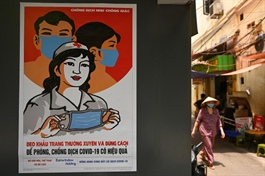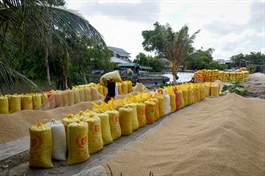Public debt essential to restore economy
Public debt essential to restore economy
Public debt will increase significantly due to the ongoing tireless efforts of the government to contain the Covid-19 pandemic throughout the year. Now, very focused measures need to be taken to once again revive the economy and stimulate growth.
Illustrative photo.
|
Dr. NGUYEN TRI HIEU, a banking and financial expert, spoke with Saigon Investment on the need to manage this huge public debt and increase resources to once again boost the economy.
JOURNALIST: - Sir, according to the Ministry of Finance, we must accept this increase in public debt so as to once again recover the economy. What are your views on this issue?
Dr. NGUYEN TRI HIEU: - I think that increasing public debt by 2021 is essential because the Government needs to invest more money to restore the economy. However, the current target of public debt on GDP is not safe, in my opinion. With new calculations of GDP, Vietnam's public debt is very low, but we should not use this indicator to monitor public debt. In the US there is an absolute fixed figure for public debt, and when public debt reaches that figure or is close to that figure, the government must ask Congress to raise the ceiling. This makes public debt tracking more accurate and realistic. When using the rate of 65% against GDP according to the approved threshold by the National Assembly, if GDP increases then the scale of public debt will also increase and will then cause difficulties in public debt management.
I tend to calculate the ratio of public debt to absolute numbers, instead of considering the safety of public debt to GDP. When calculating GDP in the old way, public debt rate in 2021 will be 58.6%, but according to the new calculation, the increase in GDP will push public debt down. This may create an illusion of controlling public debt, so besides loosening public debt in 2021, there is an absolute public debt ceiling outside the ceiling of 65%. With these safety thresholds, the Government must immediately propose to the National Assembly to make appropriate adjustments.
- Sir, currently 40 countries have lowered their credit rating, mainly from the financial support received for containing the Covid-19 pandemic, leading to increase in public debt. Does Vietnam face the risk of public debt now?
- If public debt increases, it may affect the national credit rating, but increase in public debt is not negative. What lowers the national credit rating is the ability to repay the debt. If countries increase public debt but their ability to repay debt decreases, their credit score will decrease. For Vietnam, credit rating companies will also target the ability to pay debt ranking based on factors such as proportion of public debt in the safe threshold, and size of quantitative public debt. For instance, a country must have enough foreign currency to repay its foreign debt, or have enough foreign exchange reserves to cover for at least three months of imports.
This is a general assessment, but under the current situation, increasing domestic and foreign capital is necessary. However, the foreign financial market is currently fluctuating heavily from macroeconomic problems and the Covid-19 pandemic. Therefore, loosening public debt requires increasing domestic resources, which means that increasing public debt in 2021 will require recovery of the economy.
- Sir, in your opinion, should we increase domestic resources when borrowing public debt at this time?
- Public debt can be borrowed from domestic and international markets and to borrow domestically, the government uses domestic bonds. This time there is an advantage that government bonds are being issued under lower interest rates, so the Government can borrow at relatively lower interest rates than before. At the same time, our country's financial market today is experiencing many fluctuations. Although the VN Index increased due to the pandemic, the country's financial situation is not as stable as before, and capital in banks, as well as other sources of capital, have been affected. However, government bonds are always the safest asset in the monetary system in Vietnam. This is an advantage for the Government to mobilize capital in the country.
On the international side, Vietnam still receives support to borrow from international markets. However, this loan is limited because Vietnam has a very low credit score, which is discouraging and also risky. Therefore, when issuing international bonds, Vietnam has to bear higher interest rates than countries with higher credit scores. When issuing bonds, Vietnam can borrow from other governments under ODA programs. However, Vietnam has entered the group of middle-income countries, so the advantages of borrowing money from governments in the past have also disappeared, that is, they have to pay higher interest rates when accessing ODA loans. Other sources to support the Vietnamese economy are remittances and Foreign Direct Investment (FDI) and Foreign Indirect Investment (FII), which are all currently affected by the Covid-19 pandemic.
With the above analysis, I think that it is advisable to promote capital mobilization in the country, take advantage of social financial resources, and issue bonds for people and economic organizations. If it is possible to increase domestic borrowing, there will be no foreign exchange risks. We will also have no need to meet so many conditions when borrowing ODA from foreign governments.
It is important to carefully consider the use of capital. As of now, the government has two big burdens to deal with, namely, investing in infrastructure for further economic development, and to once again restore all businesses back to normal. Restoring businesses is of utmost importance because during the recovery phase if businesses still remain weak, then the entire recovery process will weaken. However, the government still has to pour much more money into several public projects and essential infrastructure, as these factors are the very foundation for development. Hence, how to balance these two goals is a problem that the Government must resolve in their financial plan. Therefore, the Government must have specific and very detailed plans on how to invest in public projects and restore businesses back to normal.
- Thank you very much.




























